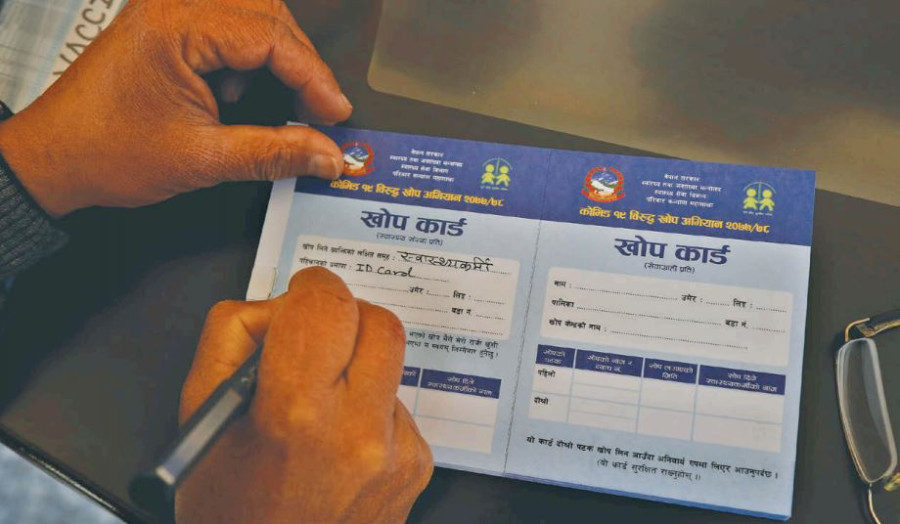Health
Nepali authorities in a fix over vaccination drive as WHO suggests ‘own decision’ on doses amid vaccine shortage
Authorities say they are not in a position to say anything right now as there are just enough doses to vaccinate only those who took the first shots in the first phase.
Arjun Poudel
Amid uncertainties over the supply of Covid-19 vaccine, the World Health Organisation has issued deployment guidance and suggested that countries take their own decisions on carrying out the vaccination drive.
“If vaccine supply is insufficient to cover the target priority population with two doses, countries should consider two options,” the UN health agency said in a letter to the Health Ministry, a copy of which is seen by the Post.
“First, reducing the number of target priority individuals by stratifying risk within the priority groups and providing those newly defined target individuals with 2 doses; and second stretching all available doses to vaccinate priority groups with at least one dose until supply is replenished.”
After becoming one of the first countries to launch the vaccination drive, Nepal is currently struggling to acquire sufficient doses to continue the campaign.
Officials, however, said they are not in a position to take any decision on the vaccination drive as yet.
“We have sufficient doses in stock for second shots for people who took their first jabs in the first phase. We have decided to administer the second dose to them from April 20 to 24,” Dr Jhalak Gautam, chief of the National Immunisation Programme, told the Post. “We can say more about our vaccination programme only after we get additional vaccines.”
In the first phase between January 27 and March 5, around 438,000 people were given the first dose of the vaccine. The number was quite high during the second phase, aimed at vaccinating people over 65 years of age, between March 7 and March 15, when a little over 1.35 million got their first dose. These people need to be given the second shot between May 16 and May 30.
Nepal so far has used the Oxford-AstraZeneca vaccine, which is manufactured by the Serum Institute of India under the brand name Covishield.
The government has currently suspended its vaccination drive for the lack of doses.
The UN health recommends two standard doses (0.5mL) with an interval of 8 to 12 weeks between doses.
“There is evidence that 1 dose of the vaccine can provide efficacy as high as 76 percent for individuals for up to 12 weeks, however antibody concentrations decrease throughout the 90 days,” the WHO has said. “Countries are advised to calculate whether supply is sufficient to administer a full 2-dose schedule for all desired priority groups, with an 8–12-week dose interval.”
Gautam said that the government is hoping to receive vaccines to be provided under the World Health Organisation-backed COVAX facility within May.
Under the COVAX programme, Nepal is expected to receive vaccines enough for 20 percent of the 30 million population, which will mean around 13 million doses.
Under this programme, Nepal so far has received 348,000 doses.
In the guidance material shared by the World Health Organisation with the Health Ministry on March 19, the UN health agency says while supply is expected to increase through the second half of 2021, the frequency of shipments to countries remains uncertain in the near to medium term and residual shelf life at the time of delivery may be as short as three months.
The short supply in Covishiled vaccine has resulted from India’s decision last week to put a temporary hold on exports of vaccines manufactured by the Serum Institute, the world’s largest vaccine manufacturer, to meet the demand at home, as the country of 1.3 billion people lately has seen a resurgence in Covid-19 cases.
Nepali authorities, who were earlier planning to consult the UN health agency on administering all available doses, said they are not in a position to decide at this time due to the uncertainty over supplies.
“We could have administered all the available doses at the time we got the vaccine,” Dr Shyam Raj Upreti, coordinator of Covid-19 Vaccine Advisory Committee, told the Post. “Now it is too late and we have committed to providing second doses to those who took the first shots in the first phase of the campaign.”
Some countries including the United Kingdom had given first doses to a maximum number of people and delayed the second doses to 12 weeks.
UK cases of Covid-19 were surging in December, along with hospitalisations and deaths, and there was a risk that the health facilities could be overwhelmed.
Health authorities then decided that it would be better to give the protection of a first dose to as many people as possible, as fast as possible. That meant delaying second doses, on the grounds that they would add only limited extra protection to people who already had significant immunity from their first dose.
After the first phase of vaccination drive, which was launched with the India-gifted 1 million doses, Nepali authorities were planning to administer Covid-19 vaccine to all above 55 years of age, among whom severity and death rate is extremely high compared to the rest of the population.
But then there was a setback. After providing one million doses of the order placed–and paid–for two million doses, the Serum Institute expressed its inability to provide the remaining doses. Nepal’s plan to procure an additional five million doses from the Serum Institute also failed to move forward.
Amid the Serum Institute’s inability to provide the vaccine, the COVAX facility also could not supply all the doses that it pledged in its interim forecast.
The Health Ministry then changed its plan and decided to vaccinate people over 65 years of age in the second phase.
Officials now say there is no certainty of supply of vaccine anywhere to provide the second doses to around 1.35 million population, leave alone giving the first dose to others.
According to Upreti, a second dose of vaccine is required to administer prolonged immunity.
The WHO has said that efficacy of 76 percent could be expected with no waning immunity for a period of up to 12 weeks. In this situation the country may consider maximising the interval between doses to 12 weeks to provide more flexibility to accommodate the uncertain arrival of the replenishment.
Days after India put a temporary ban on vaccine exports, UNICEF said on Saturday, according to a Reuters report, that the WHO-backed COVAX programme expected that the Serum Institute will resume full deliveries of the AstraZeneca shots to it in May.
“Deliveries of SII/AZ vaccine are expected to begin fully again by May, with catch-up deliveries to reach every participant’s full allocation up to May, accelerating thereafter,” a UNICEF spokeswoman told Reuters in an email.
UNICEF is the distributing partner of the programme, run with the GAVI vaccine alliance.
“We are not even getting the vaccine for which we have paid for,” Dr Tara Nath Pokhrel,” a member of the Covid-19 Vaccine Advisory Committee, told the Post. “Without guarantee of supply of additional doses, a new decision cannot be made.”
After a dramatic decline in the number of new infections, Nepal lately has reported a steady rise in Covid-19 cases. The surge in cases in India, with which Nepal shares a long open border, has also come as a cause for concern.
Nepal recorded 162 new cases on Wednesday, pushing the total tally to 277, 309. N0 death was reported in the last 24 hours. So far, according to the Health Ministry, 3,030 people have died from Covid-19-related complications. The Number of active cases stands at 1,493.
Meanwhile, the Health Ministry said on Wednesday that it has directed agencies to start preparations to administer the vaccine gifted by China to people between 40 and 54 years of age.
The China-gifted 800,000 doses of coronavirus vaccines, developed by Sinopharm, an affiliate of the state-backed pharmaceutical giant Sinopharm, arrived in Kathmandu on Monday morning.
Nepal has not used the Chinese vaccine yet.
“A meeting of the incident command system held on Wednesday [discussed ways to] ensure that people will get both doses of the vaccine of the same brand,” Dr Samir Kumar Adhikari, joint spokesperson for the Health Ministry, told the Post. “It will take some time to put things in order.”




 26.7°C Kathmandu
26.7°C Kathmandu















